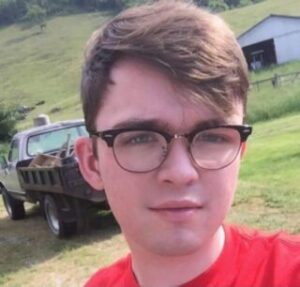Ensure all have a voice by extending full re-enfranchisement to formerly incarcerated people
 In recognition of the 50th Anniversary of the 26th Amendment as another landmark piece of Civil Rights legislation, the Rural Youth Catalyst Project is excited to partner with CIRCLE’s Youth Expertise Series: Fulfilling the Promise to offer the voices and perspectives of rural young people. This week we bring you the voice of Garrett Blaize.
In recognition of the 50th Anniversary of the 26th Amendment as another landmark piece of Civil Rights legislation, the Rural Youth Catalyst Project is excited to partner with CIRCLE’s Youth Expertise Series: Fulfilling the Promise to offer the voices and perspectives of rural young people. This week we bring you the voice of Garrett Blaize.
Garrett was selected as a delegate for the 2020 National Rural Assembly Youth Summit. Garrett serves as Grants Manager at the Appalachian Community Fund and their partner organization Central Appalachian Arts Assembly. They are an organizer and capacity builder for Southern Appalachian Mountain Stewards a community-based organizer organization that organizes around social and environmental justice issues. In addition, Garrett serves our country as a soldier in the Virginia Army National Guard where they have most recently been deployed to assist in the distribution of the COVID-19 vaccine across Southwest Virginia. Additionally, Garrett is currently engaged in a year-long project to develop strategies to resource and support individuals employed in the rural care economy through Ideo.org’s care constellation cohort.
By Garrett Blaize
July of this year marked the fiftieth anniversary of the Twenty-sixth Amendment to the United States Constitution, which was formally ratified in July of 1971. In ratifying this amendment the United States tremendously expanded vote enfranchisement by universally prohibiting restrictions on the right to vote based on age for any citizen over the age of eighteen.
While this action marked a historic shift there still exists significant barriers to voting and civic participation among youth throughout the United States. This is especially true in the most marginalized communities of our country where the lack of mobility imposed by structural poverty and gaps in vital infrastructure makes voting (and civic participation more broadly) a burdensome and difficult task.
The criminalization of young people across America, especially black, brown, and indigenous youth leaves many youth voices without a voice in our elections. This is compounded by exploitable policies like “prison gerrymandering” where incarcerated people are counted as constituents of the electoral district they are incarcerated in. This amplifies the voting power of the largely aging, largely white communities where prisons are often cited to the disadvantage of other communities, particularly the communities from which incarcerated people are uprooted.
These hard barriers to voting cannot be addressed outside of deep structural reforms, including especially the formal enfranchisement of formerly incarcerated people which would be a tremendous step towards building a more engaged, robust, and healthy democracy in America.
While such an action, especially on the national scale may seem far out of reach, the arc of our history is embodied by the struggles for greater access to our democracy as seen in the movements towards the general franchise, abolition, birthright citizenship (as guaranteed by our 14th Amendment through the efforts of newly freed slaves in the aftermath of our Civil War), women’s suffrage and civil rights among others.
To truly honor the history of the Twenty-sixth Amendment we must take concrete action across the country and at the federal level to offer full re-enfranchisement to formerly incarcerated people to ensure that all families and all young people have a voice in our democratic processes.
Garrett Blaize was selected as a delegate for the 2020 National Rural Assembly Youth Summit. Garrett serves as Grants Manager at the Appalachian Community Fund and their partner organization Central Appalachian Arts Assembly. They are an organizer and capacity builder for Southern Appalachian Mountain Stewards a community-based organizer organization that organizes around social and environmental justice issues. In addition, Garrett serves our country as a soldier in the Virginia Army National Guard where they have most recently been deployed to assist in the distribution of the COVID-19 vaccine across Southwest Virginia. Additionally, Garrett is currently engaged in a year-long project to develop strategies to resource and support individuals employed in the rural care economy through Ideo.org’s care constellation cohort.
The Rural Youth Catalyst Project is an independent working group aligned with the Rural Assembly. Working nationally, the Rural Youth Catalyst Project aims to strengthen and create opportunities that allow rural and Native youth to realize their hopes and dreams while remaining in or returning to their communities.
Collaborate with us: For additional information about the Rural Youth Catalyst Project or to collaborate with us please contact Kim Phinney and Kathy Moxon. Kim can be reached at [email protected] and 802-922-2274. You’ll find Kathy at [email protected] and 707-498-9502.







